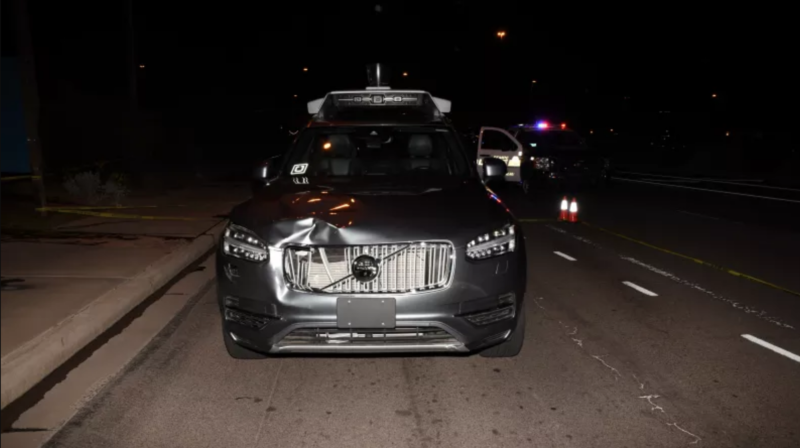Keep eyes on the road —
Prosecutors decided not to prosecute Uber in 2019.
Timothy B. Lee
–

Enlarge / The Uber vehicle after it struck Elaine Herzberg.
An Arizona grand jury has indicted Rafaela Vasquez, a former safety driver in Uber’s self-driving car project, for the 2018 death of pedestrian Elaine Herzberg in Tempe, Arizona. Prosecutors decided not to charge Uber criminally last year.
The crash occurred after dark on a well-lit stretch of Mill Avenue. Herzberg was crossing the multilane road with her bicycle when the Uber SUV struck her at 38 miles per hour. Footage from a driver-facing camera shows Vasquez looking down at her lap for more than five seconds just prior to the crash. Officials found that Vasquez had been streaming a reality show called The Voice to her phone just before the crash.
Vasquez is being charged with negligent homicide, a charge similar to manslaughter that carries a recommended sentence of 2.5 years. However, the grand jury also charged that the crime was committed with a “dangerous instrument”—namely the car. When negligent homicide is committed with a dangerous weapon or instrument, the recommended sentence increases to six years.
“Distracted driving is an issue of great importance in our community,” a Maricopa County attorney said in a press release. “When a driver gets behind the wheel of a car, they have a responsibility to control and operate that vehicle safely and in a law-abiding manner.”
The grand jury formally approved the charges in August, and Vasquez was arraigned on Tuesday. She was freed pending trial and must wear an ankle monitoring device.
“We shouldn’t be hitting things every 15,000 miles”
Senior Uber managers were warned about problems with the self-driving technology in the months before the Herzberg crash. Indeed, one departing Uber engineer, Robbie Miller, sent a scathing email to the head of the self-driving program days before Herzberg’s death.
“A car was damaged nearly every other day in February,” Miller wrote. “We shouldn’t be hitting things every 15,000 miles.”
Miller pointed to an incident the previous week (nine days before Herzberg’s death) when an Uber test vehicle “drove on the sidewalk for several meters.”
“At Waymo I would not have been surprised if the entire fleet was immediately grounded for weeks or longer if a vehicle exhibited the same behavior,” Miller wrote. Instead, he reported, the incident “was essentially ignored” until Miller brought it to the attention of management.
But Uber escaped criminal liability for the crash.
“After a very thorough review of all evidence presented, this office has determined that there is no basis for criminal liability for the Uber corporation,” a prosecutor wrote.
Uber struck a quick settlement with Herzberg’s heirs. But the crash shattered Uber’s fledgling self-driving technology program. Uber shut the program down for months and permanently ended testing in Arizona. Nine months after the crash, Uber finally resumed testing on a much smaller scale in Pittsburgh.

